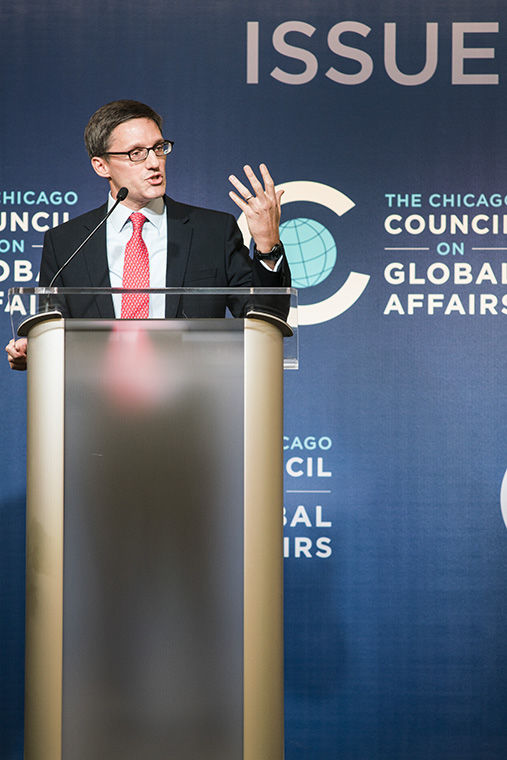Former Obama adviser: patience is key to foreign policy
Derek Chollet, former adviser to President Barack Obama, spoke about the nation’s foreign policy legacy during a Chicago Council on Global Affairs Nov. 3.
November 7, 2016
Despite harsh criticism from both political rivals and the general public, President Barack Obama has implemented a long-term foreign policy strategy through patience and restraint, according to his former special adviser Derek Chollet.
The current counselor and senior adviser for The German Marshall Fund of the United States spoke about his new book, “The Long Game,” at the Chicago Council of Global Affairs Conference Center, 130 E. Randolph St., Nov. 3. In this book, Chollet argued that history will look, as it has for previous presidents, at Obama’s foreign policy strategy in better light than people look at it today.
“President Obama has what academics call a grand strategy,” Chollet said. “In history’s long game, the Obama presidency on foreign policy will be remembered as an extremely consequential presidency and one for the better.”
Chollet compared Obama’s international plans to gardening, for which one needs to be diligent and patient in order to see progress. However, problems develop in selling that approach, he said, given today’s fast-paced society.
Obama has also faced the consequences of former President George W. Bush’s economic and military misjudgments. This proved to be difficult and is a dilemma the next president will face because the job is not complete, Chollet said. Adding that the president has been unjustly blamed for them.
“[The president] inherited a situation at home and abroad that was fundamentally unsustainable,” Chollet said.
Alexander Wegner, a political science graduate student at the University of Chicago who attended the discussion, said he agreed with several of Chollet’s positions on Obama’s leadership.
One part of Obama’s foreign policy he agreed with was that the president did not side with Syrian rebels against President Bashar al-Assad and did not succumb to pressure from his political rivals.
“Obama did the right thing by being careful, by not repeating the same mistakes the Bush administration has made,” Wegner said.
However, if one looks at the current refugee crisis, they have to ask if more could have been done, Wegner said.
Obama is more likely be looked at as a good president—particularly in contrast to Bush—Wegner said, and one who had good intentions and a plan for the future.
Wegner said a cautious approach to foreign policy, as Obama has had, is sound. However, he said there could be moments in the future where action is needed, and Hillary Clinton or Donald Trump will have to address that.
Evan Goldberg, an international strategist at the Northwestern University’s School of Law, said it was interesting to receive an insider’s perspective on the president’s international strategies over the last eight years.
Goldberg said he does not know whether the “long-term strategy” is an accurate position to take, but said it is a favorable way to view Obama’s foreign policy.
“[Chollet] firmly believes that is the case,” Goldberg said. “I don’t think he is trying to make excuses for the president.”
A more controversial and criticized aspect of Obama’s presidency is recognizing the country’s mistakes, Chollet said, but argued that the president’s willingness to acknowledge those missteps and indiscretions is the sign of a strong and effective leader.
“He sees the acknowledgment of our fallibility and the understanding that the United States can learn from mistakes and constantly renew itself and make it better as the key to our strength and leadership in the world,” Chollet said.








